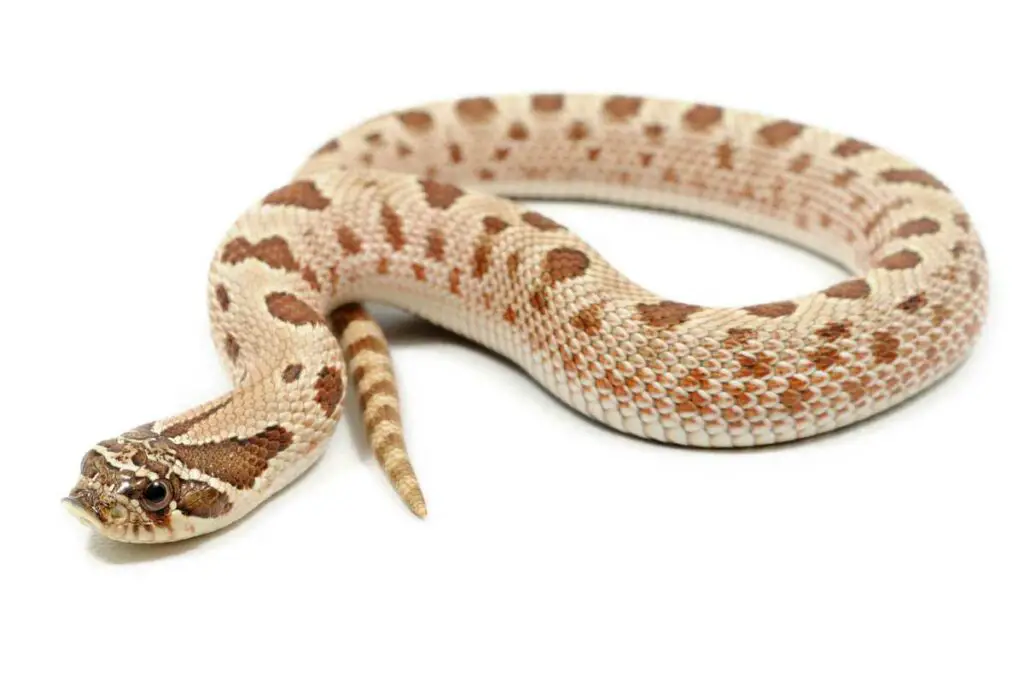Armadillos are not friendly animals, but they are not particularly unfriendly either. Armadillos are solitary mammals that prefer a solitary life, spend most of the day hiding in underground burrows and when threatened, they default to defensive mode.
While it is hard to label armadillos as either friendly or unfriendly, we can tell a lot about these uniquely armored creatures from their behavior.
For example, we know that these nocturnal animals are timid, maternal, insect-eating machines.
Table of Contents
7 Armadillo Behaviour Facts
1. Are Armadillos Nocturnal?
Most armadillo species are nocturnal and sleep up to 16 hours a day in underground burrows.
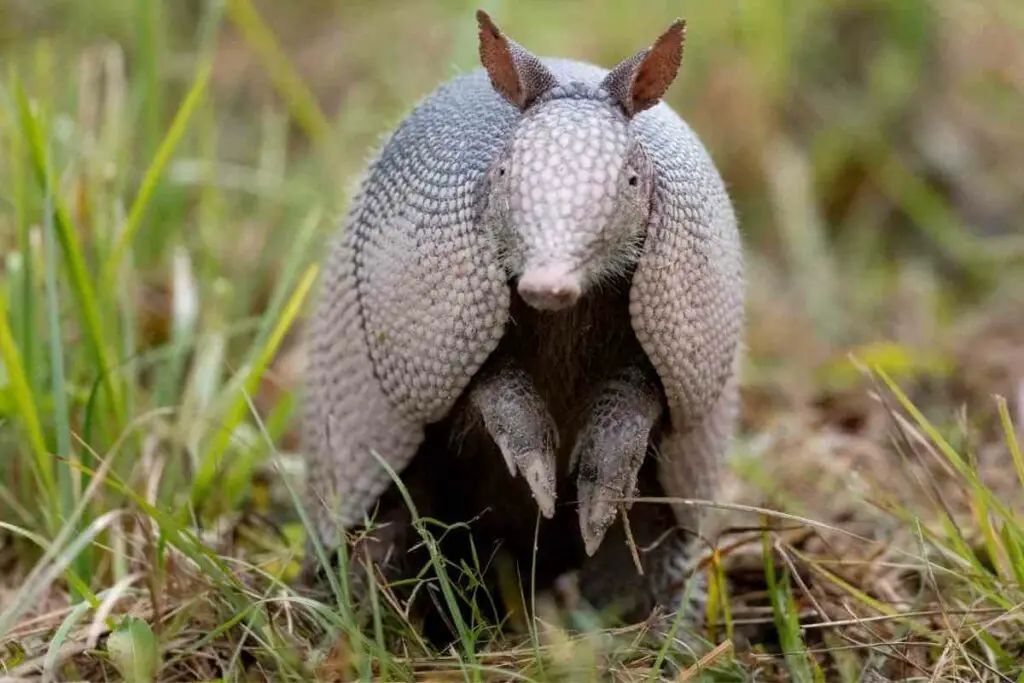
Due to their nocturnal habits, armadillos and humans rarely interact with each other.
If an armadillo does run into a human, its instinct is to run away, dig a hole to hide in, or hunker down into the dirt to protect its softer belly.
Very rarely, a cornered armadillo will spit towards a predator that has it cornered.
Although spitting may not sound dangerous, the armadillo is the only animal besides humans that can carry leprosy, and spitting is one means of transmission.
2. How Many Hours a Day Do Armadillos Sleep?
Armadillos sleep up to 16 hours a day in underground burrows.
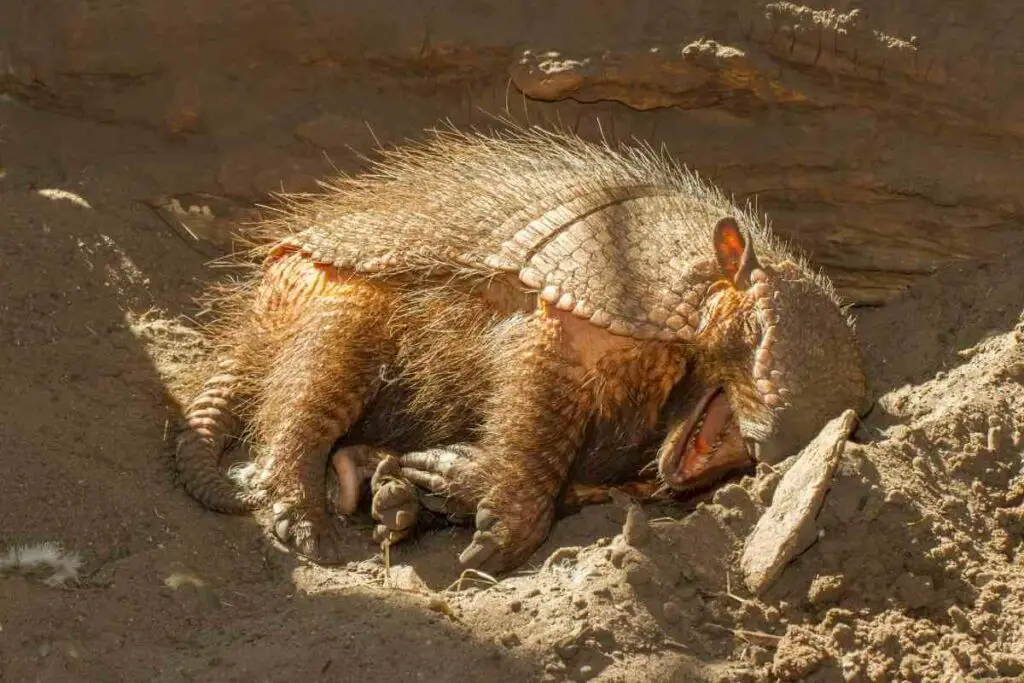
Sleeping during the day helps the armadillo to avoid scorching daylight temperatures.
Once the sun has set and the cooler night temperatures kick in, the armadillo starts its night foraging.
Armadillos spend the night hours foraging for insects, larvae, and grubs.
Less-known Fact: When it comes to the total time spent feeding, the armadillo is one of the most active mammals behind two marsupial species and ground squirrels.
3. Do Armadillos Roll in Balls?
It is a commonly held belief that all armadillo species roll into a ball and protect themselves when threatened.
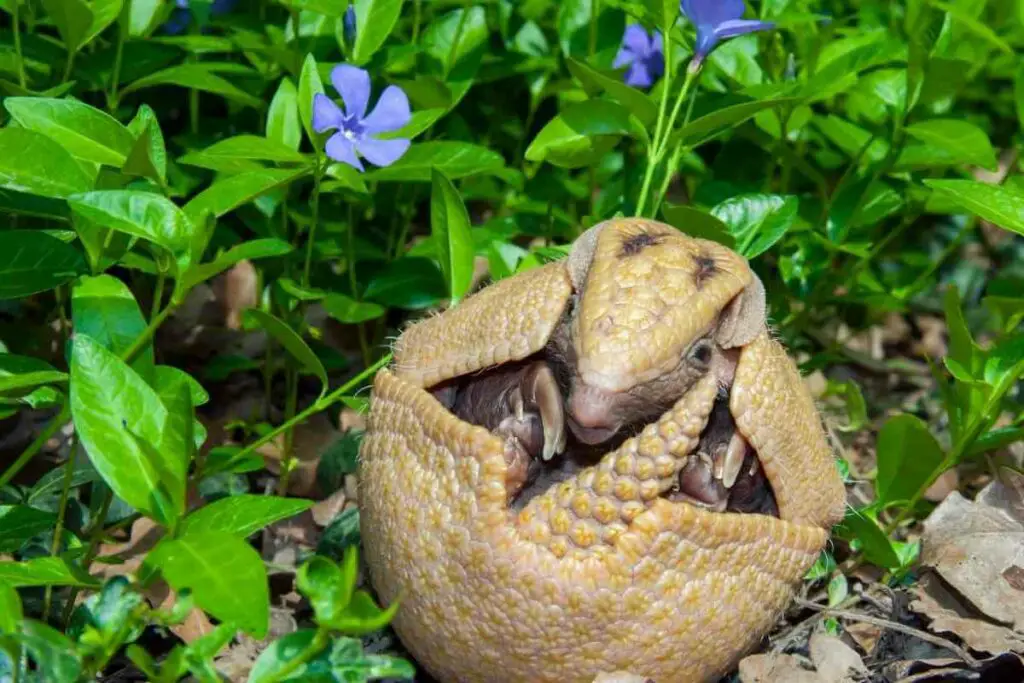
Only two species of armadillo can completely roll into a ball as a method of defense – both three-banded armadillos.
When threatened, the three-banded armadillo rolls itself into a tight ball to protect its softer underbelly by only exposing its hard armor shell.
These defensive mammals would prefer to let the danger pass than tangle with confrontation!
4. How Do Armadillos Dig Their Burrows?
Armadillos have long, sharp claws that they use to dig burrows, but you don’t need to worry – they use them almost exclusively for movement and when digging underground homes.
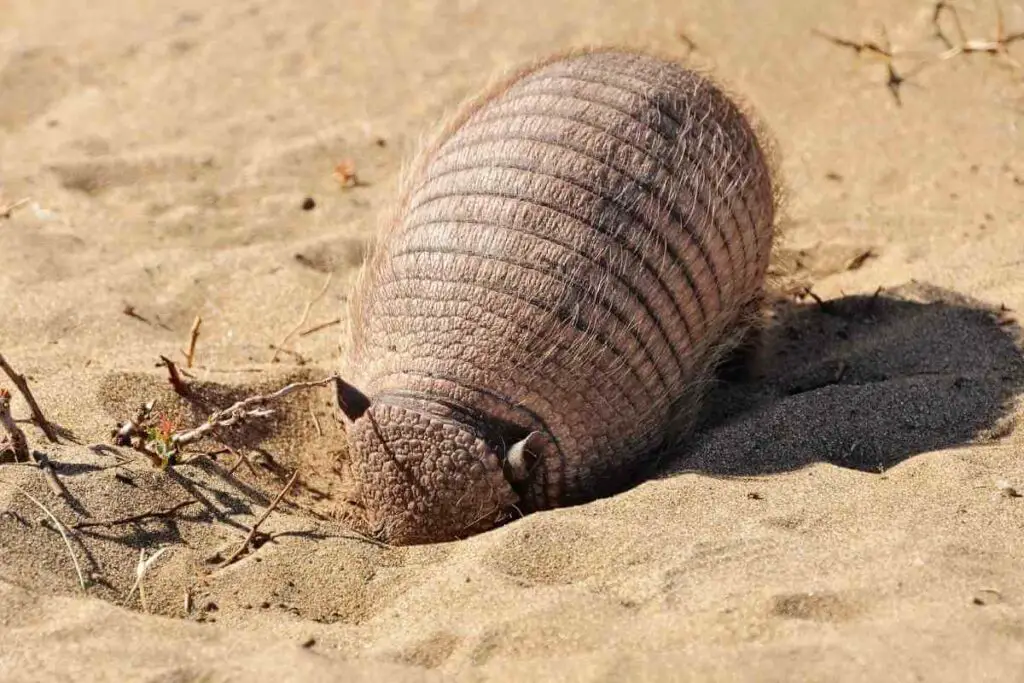
That isn’t to say that you should chance getting close to an armadillo, though, because armadillos are the only mammal aside from humans that can contract and spread leprosy.
Speaking of big claws, the long giant armadillo has just one claw that measures almost eight inches long!
Amazingly: These enormous animals also dig burrows that can reach as much as sixteen feet deep – a relatively easy feat with such huge claws!
5. Are Armadillos Good Moms?
Yes! Female armadillos are pregnant for between sixty days to four months, and after giving birth to between one and twelve offspring, the female raises them alone in her burrow.
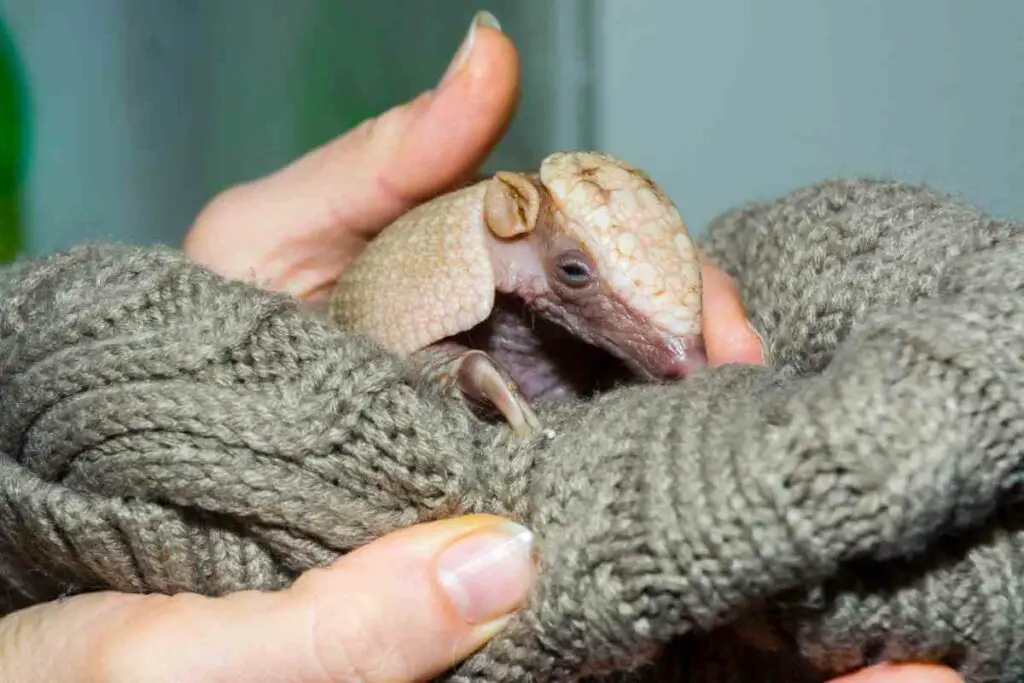
No matter the species, armadillo offspring need constant care from their mother and feed exclusively on mother’s milk for their first few weeks of life.
After they ween from their mother’s milk, the female armadillo will take her young out to forage and teach them how to be more self-sufficient.
Young armadillos stay with their mom for around seven months before they venture out on their own.
As for the male armadillo, like many species, the male plays a role in impregnation and is then on his way, leaving the female to do the rest by herself!
6. Do Armadillos Play Dead?
Some armadillo species do play dead when threatened!
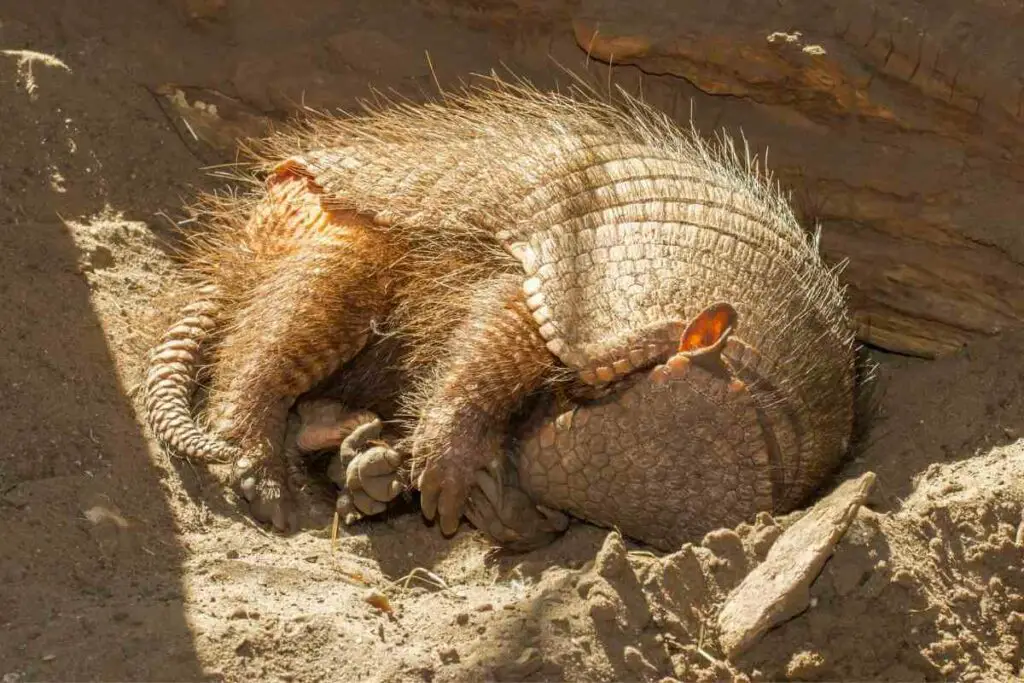
The nine-banded armadillo, for example, leaps in the air to attempt to escape from predators.
If caught by predators, however, the nine-banded armadillo resorts to playing dead.
Playing dead – also called thanatosis – is a common technique among some animals to avoid being eaten.
Thanatosis works because most predators are confused by the sudden “death” of prey, and this shock gives the prey animal enough time to make a quick escape.
Intelligent “Move”: Thanatosis also deters some predators because they prefer to eat fresh kills and not animals already deceased – this is generally a survival tactic as older meat can cause sickness or even death.
7. Are Armadillos Good Hunters?
Armadillos are great nocturnal hunters, but they hunt down insects and grubs using their sense of smell.
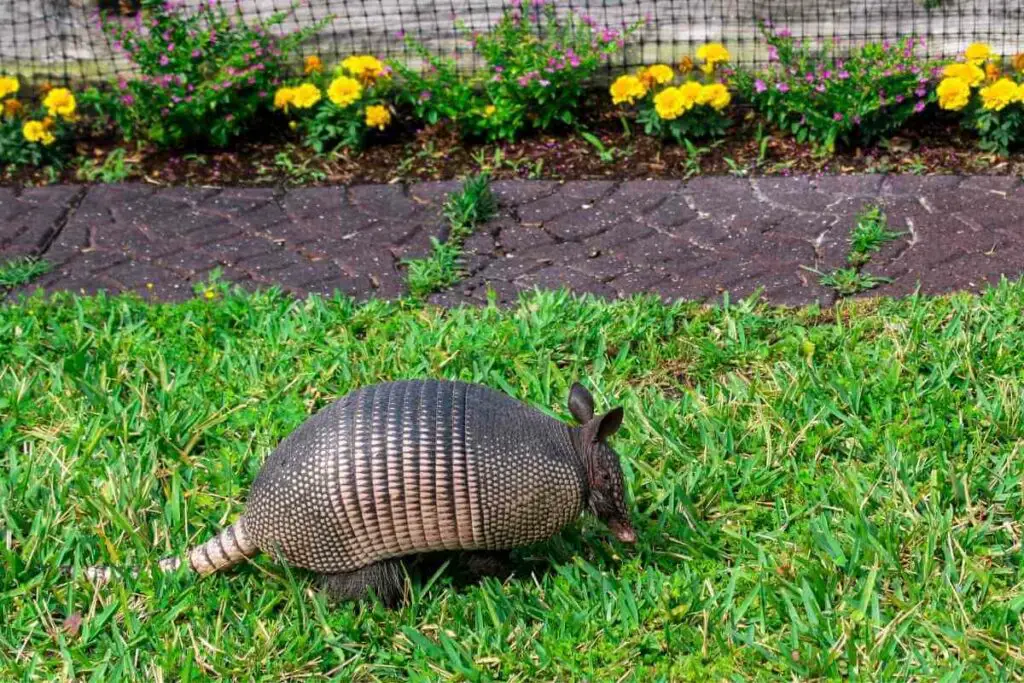
Once they find plenty of insects to snack on, the armadillo can use its long sticky tongue to catch a lot of small insects at once!
The armadillo doesn’t just rely on its sense of smell to hunt though, this night-time forager has exceptionally sharp hearing.
Their acute hearing does more than lead them toward a meal though, it is also ideal for avoiding hungry predators!
Although the armadillo has developed a skilled hunting technique, you might be surprised to know that this armor-plated omnivore has terrible eyesight!
The armadillo has no light-detecting cells in its eyes and has very fuzzy vision.
Unfortunately: Because the armadillo has sensitive light-receptor cells in its eyes, its vision suffers in daylight too – in fact, during daylight hours, this poor critter is almost blind!
Conclusion
Armadillos are neither friendly nor unfriendly, but their behavior does tell us that these placental mammals are sleepy nocturnal digging machines that shy away from confrontation, make great mothers and hunters, and avoid human contact whenever possible.




